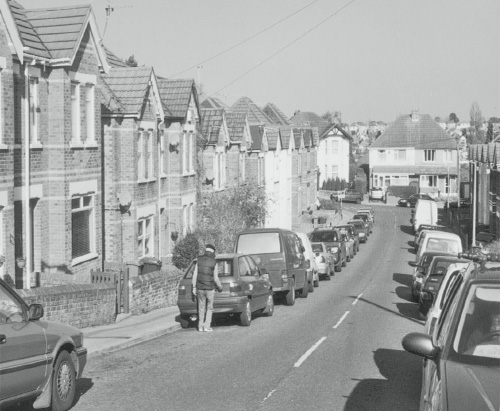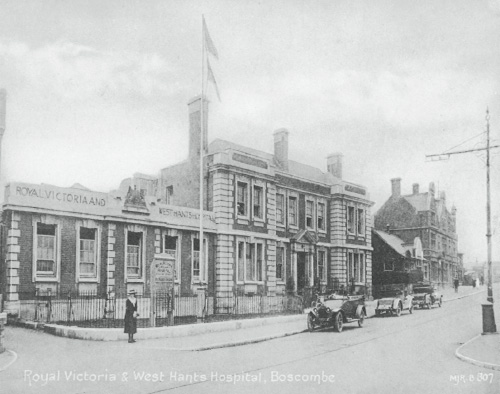Dorset Murders (17 page)
While these snippets of information about Allaway were purely circumstantial evidence, Humphris's second statement seemed to link him to Bournemouth station and to a woman matching the description of Irene Wilkins. Allaway was promptly elevated to the top of the list of suspects.
Allaway and his family had recently moved house from Haviland Road to a flat in Windsor Road, Boscombe. He must have got wind of the renewed police interest in him as he began to make preparations to flee the area. On 20 April, he stole his employer's chequebook and forged Sutton's signature, obtaining more than £20 from local traders who knew him as Sutton's chauffeur. He sent his wife and child to her parents' home in Reading and he himself travelled to North London, using the alias Mr T. Cook.
The theft of the cheques was reported to the police on 22 April and Inspector Brewer was sent to London to arrest Allaway for forgery. However, Brewer was unable to locate his quarry and accordingly a watch was placed on the Reading home of Allaway's in-laws. On the evening of 28 April, Allaway was spotted arriving at Reading but, as the police moved in to apprehend him, he ran off. A passer-by saw the resulting chase and stuck out a foot, sending Allaway sprawling, thus allowing the police to capture him.
Charged with forgery, Allaway was detained at Reading until Superintendent Garrett arrived to collect him and escort him back to Bournemouth. While in Reading, Garrett visited Mrs May Allaway to obtain some samples of her husband's writing. With her permission, police later took possession of seven postcards from the flat in Boscombe that her husband had sent to her in the past. These were sent to a handwriting expert in London, Mr Gerald Guerin, along with the decoy telegrams and some betting slips found in Allaway's pockets on his arrest. Guerin was certain that the postcards and telegrams were written by the same hand and, having examined the betting slips, he also pointed out that the chauffeur had changed his handwriting style since 22 December.
Back in Bournemouth, Allaway was placed in an identity parade with several other men dressed in chauffeur's uniforms. Witnesses, including Mr Humphris and post office clerk Alice Waters, picked him out of the line up immediately, while newsagent Albert Samways had no hesitation in identifying him as one of two men who had purchased a
Morning Post
newspaper from him on 22 December. One of the other members of the identity parade was very similar in physical appearance to Allaway and some witnesses initially picked out the look-alike. Most seemed to realise that they had made an error and asked for a second look, this time choosing Allaway.
On 6 May, Thomas Henry Allaway was formally charged with the murder of Irene Wilkins. Asserting his innocence, he asked police for a pen and paper so that he might write a statement. The resulting document was riddled with spelling mistakes and the handwriting was seen to change in style from upright to the right-handed slope of the telegrams.
After magistrates at Bournemouth Police Court heard the case, they committed Allaway to stand trial at the next Hampshire Assizes. The proceedings opened at Winchester Castle on 3 July 1922, with Mr Justice Avory presiding. Mr Thomas Inskip KC MP led the case for the prosecution, while Mr A.C. Fox Davies defended.
No less than forty-three witnesses were called for the prosecution while only eighteen appeared for the defence, including Allaway himself. The accused first denied having written any of the telegrams. The postcards to his wife, written while he was serving in Germany with a motor ambulance convoy in 1918, had been penned for him by another man, after he had sprained his wrist starting an engine. He also denied having changed his handwriting after the murder and was most emphatic in stating that he had not killed Irene Wilkins, saying that, at the time of her murder, he had been in a Working Men's Club and later the Salisbury Hotel. Yet, in the course of giving evidence, Allaway also proved himself to be poor at spelling. Asked by the judge to spell the word pleasant, he immediately replied that it was spelled like the word present. The telegram to Nurse Burnside had requested a âplesent [
sic
] companion'.
The purpose of most of the defence witnesses was to support Allaway's alibi. A Mrs Dundee confirmed that she had seen Allaway in Boscombe at 8 p.m. on the night of the murder. She was certain of the date, because she had been going to the Hippodrome to see a performance. Several witnesses recalled seeing the defendant in the Conservative Club and several more remembered that he was in the Salisbury Hotel from 8.05 p.m. to 9.55 p.m. Charles Barrett, the owner of the Portman Mews garage, stated that he had locked the Mercedes in the garage at about 6.15 p.m. Barrett said that he had the only key to the premises, although this particular evidence was disproved as a copied key had been found at the Allaway's home. Taxi driver George Troke also testified that Mr Sutton's car had been locked in the garage at the time of the murder. However, although all of these witnesses initially appeared certain of the truth of their statements, it became evident during cross-examination that most were confusing dates and times.
Postman Arthur Elkins was a much more credible witness for the defence. On the night of the murder, he had moved his goats near the field at Tuckton in which the body was found. At 8.15 p.m., he had seen a car with dimmed headlights parked near to the scene of the crime and the car was still there when he returned about half an hour later. His hat had blown off and landed very close to the car, so he had got a good look at and described it as small, dark and looking like a taxi cab, nothing like the large Mercedes driven by Allaway.
May Allaway had stood by her husband all along and now she too gave evidence in his defence. On the night of the murder, she stated that she had left him at the Conservative Club at about 7 p.m. and gone to the cinema alone. She had met her husband by prior arrangement at the Salisbury Hotel, finding him already there when she arrived at 8.50 p.m. His appearance and behaviour that evening was completely normal and she had noticed no stains on his clothing and had seen no changes in him since the murder. She also stated that a screw-hammer and spanner found at Allaway's home, and thought to be the murder weapons, had been stored in London and had not arrived in Boscombe until the end of January.
The defence witnesses failed to convince the jury, who also managed to ignore a passionate display by Allaway's mother who, during the course of the Judge's summing up, suddenly fell to her knees in prayer. After deliberating for an hour, they returned a verdict of âGuilty'.
Asked by the clerk of the court if he had anything to say as to why he should not receive judgement of death, Allaway was so shocked at the verdict that he didn't hear the question and had to ask for it to be repeated. When it was, he responded, âI am innocent of this crime â absolutely'.
His declaration of innocence had no effect on the judge who promptly sentenced him to death for what he described as âthis foul and brutal murder'. As Allaway left the court, he suddenly glared at the judge with what one observer described as âa look of concentrated malevolence, which revealed for a fraction of time the brutal soul within him.'
An appeal was immediately lodged but it proved unsuccessful and Allaway's execution was scheduled for 19 August 1922. Shortly before his execution, he apparently made a full confession of his guilt to the prison governor, although when visited by his wife and brother, just hours later, he reverted to claiming his innocence.
John Ellis carried out the execution at Winchester and it was not the most efficient execution of his career, since the noose slipped and, rather than dying from a broken neck, Allaway died from strangulation, his death taking a couple of minutes rather than occurring instantaneously. He died without revealing his motive for the murder.
[Note: In various contemporary accounts of the murder, the man who found Irene Wilkins's body is alternatively named Octavius Nicklen or Charles Nicklen. The finder of her attaché case is named as either Benjamin Barnley or Benjamin Barnby. Engineer Frank Humphris is also referred to as Humphries.]
âYOU WOULDN'T CHEAT ME, WOULD YOU?'


I
t as perhaps a measure of the unhappiness of Frederick Young's home life that a stay in the Royal Victoria Hospital in Bournemouth with an injured hand seemed to him like a relaxing holiday. Young, aged forty-six, lived cheerlessly in Francis Road, Branksome, with a wife who was seriously mentally ill and their one son, Alfred, who worked as an errand boy. Yet a break from his work and his clinically insane wife were not the only attractions of the hospital stay for Young â the main highlight was a shapely twenty-one-year-old nurse, Flossie Davies.
Flossie had recently moved to Bournemouth from her native Wales to make a new start, having been jilted by the love of her life. Hence, she was still new to the area and rather lonely and, seeing that Fred Young never received any visitors, she made a special effort to be nice to him. Before long, she was visiting him on her days off. To Flossie, there was something reassuringly safe about Young, who was more than twice her age. Soon, she found herself falling in love with him and offering to live with him when he left hospital.
With his crippled hand preventing him from working, Young took her up on her offer without hesitation. To his neighbours, it was a perfectly respectable arrangement â Young had simply employed a nurse to look after his sick wife. To his son, Alfred, the arrangement was not as respectable as it might outwardly seem, since his Dad and his new âAuntie Flossie' were sharing a bedroom. Flossie would not immediately agree to share Fred's bed, while his wife slept alone in a different room. However, Fred pleaded and cajoled and swore undying love for her in order to persuade her, and eventually she capitulated for fear of losing him. Yet although she and Fred became lovers, Flossie's strict religious upbringing meant that, even while they shared the most intimate moments, she could not forgive herself for committing what she saw as a terrible sin.

Francis Road, Poole, 2008. (
©
N. Sly)

Royal Victoria and West Hampshire Hospital, Boscombe, 1930s
.